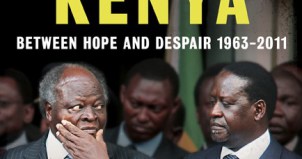Kenyan Tweets and Tribulations
They say the pen is mightier than the sword—but what about the cellphone? In Kenya, at least, this may be the case, for in one community Chief Francis Kariuki’s tweets are bringing hope to a country whose history has been marked by violent conflicts. Although most Kenyans do not have easy access to the Internet or smart phones, they can receive tweets via cell, meaning that thousands read the messages of hope Kariuki broadcasts daily (“Pray for extraordinary things today,” Kariuki tweeted recently). Even more remarkable, there’s a clear practical value to Kariuki’s Twitter, too: one night, his tweets prevented a robbery in a school teacher’s house by calling enough neighbors to the scene that the thieves were frightened away.
 Yet Kenya’s relationship with Twitter has a flipside, for the site has also been getting coverage as a player in Kenya’s ongoing conflict with al Qaeda-backed al Shabaab militants in Somalia. The militants’ tweets, which began late last year, have consisted of taunts to their opponents and bragging in the wake of attacks. This two-sided story about Twitter is evidence of how, in Kenya, everything seems to have two sides, as the political climate tends to fluctuate between reform and repression, peace and violence.
Yet Kenya’s relationship with Twitter has a flipside, for the site has also been getting coverage as a player in Kenya’s ongoing conflict with al Qaeda-backed al Shabaab militants in Somalia. The militants’ tweets, which began late last year, have consisted of taunts to their opponents and bragging in the wake of attacks. This two-sided story about Twitter is evidence of how, in Kenya, everything seems to have two sides, as the political climate tends to fluctuate between reform and repression, peace and violence.
In his new book, Kenya: Between Hope and Despair, 1963-2011, Daniel Branch spotlights this split in Kenya’s history, providing the background necessary to understand recent developments in the area. Beginning with Kenya’s independence in 1963 and following the country through a series of attempted reforms in 2009 and 2010, Branch provides a nuanced look into Kenyan politics that highlights both the hope and despair of the book’s title.
No matter how many efforts at reform are made, Branch’s analysis indicates, the violence in the country’s past has a long shadow, a fact that is made all the more evident by another one of Kenya’s recent appearances on the international news scene. At the end of January, four influential Kenyans were ordered to stand before the International Criminal Court at the Hague to answer for the violence that broke out in the wake of the country’s December 2007 election. Although the case will not come before the court until this fall at the earliest, it has already had an effect in the lead-up to Kenya’s next presidential and parliamentary elections, which are expected to take place late this year or early in 2013.























